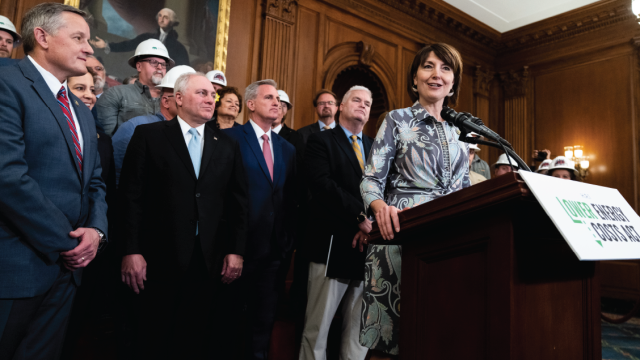
Republican leaders have staked out different positions on climate and energy issues. Some, including former President Donald Trump, have called climate change a “hoax” and downplayed the link between human activity and a warming planet. Others, including some congressional Republicans, have proposed policies to address climate change, such as supporting more nuclear power and the development of carbon capture technology.
So what do Americans who identify as Republicans or lean toward the GOP think about climate and energy issues? Here are six facts about their views, drawn from Pew Research Center surveys.
Pew Research Center published this analysis as part of its ongoing work to understand attitudes about climate change and energy issues. This analysis draws on several Center surveys. More information about these surveys and their methodologies, including the sample sizes and field dates, can be found by following the links in the text.
Few Republicans see climate change as a top priority for the country. Just 12% of Republicans and Republican leaners say dealing with climate change should be a top priority for the president and Congress, according to a January 2024 survey. For Republicans, dealing with climate change ranks last among the 20 issues included in the survey.
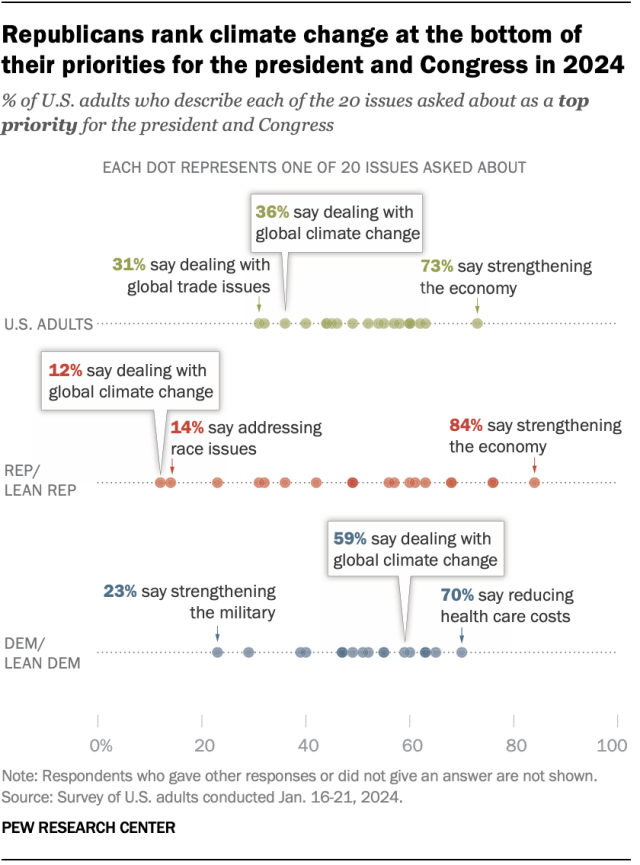
Consistent with this view, Republicans express limited concern about how climate change may impact the United States. In a spring 2022 survey, only 23% saw climate change as a major threat to the country’s well-being.
By contrast, 59% of Democrats and Democratic-leaning independents say climate change should be a top priority for the president and Congress. An even larger majority (78%) views it as a major threat to the U.S.
Partisan differences over climate change tend to be most pronounced when it comes to the perceived importance of the issue. There’s a bit more common ground when it comes to some specific policy proposals.
Despite expressing little concern about the issue generally, Republicans support some proposals to address climate change. As part of efforts to reduce the effects of climate change, majorities of Republicans support requiring oil and gas companies to seal methane gas leaks from oil wells (77%) and favor providing a tax credit to businesses to develop carbon capture technologies (67%), according to a spring 2023 survey.
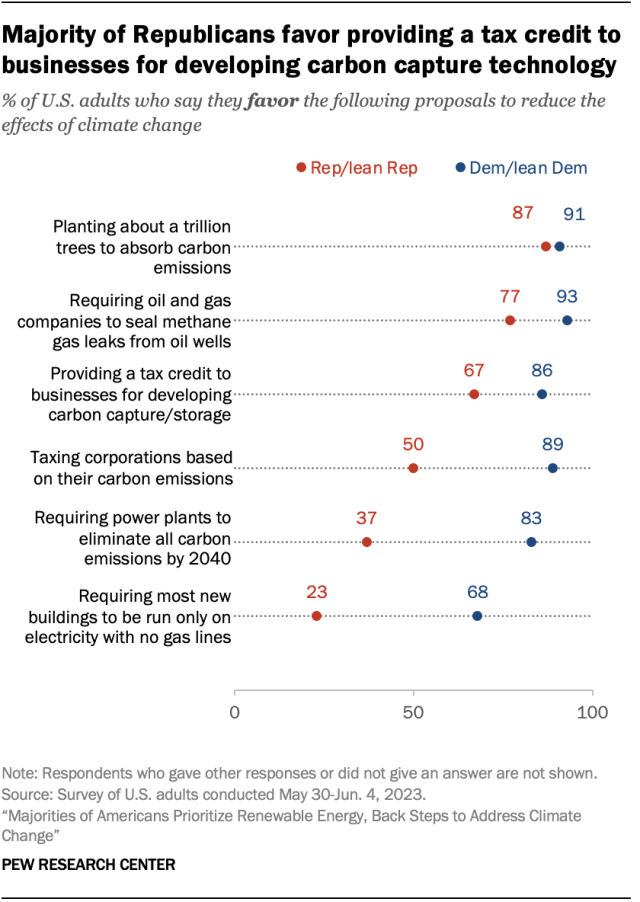
More broadly, 54% of Republicans say they strongly or somewhat support the U.S. participating in international efforts to help reduce the effects of global climate change.
Still, some more aggressive proposals to address climate change are unpopular among Republicans. Only 37% of Republicans favor requiring power plants to eliminate all carbon emissions by 2040 and even fewer (23%) support requiring most new buildings to run only on electricity with no gas lines.
Republicans tend to emphasize economic factors when considering climate policies. For example, 69% say a very important consideration for them in any climate policy proposal is keeping consumer costs low, and 61% say the same about increasing job and economic growth. A smaller share (48%) says a very important consideration is protecting the environment for future generations; by comparison, this ranks as the top consideration for Democrats.
Republicans support expanding fossil fuel and renewable energy sources. Burning fossil fuels for energy is the source of most U.S. greenhouse gas emissions. Climate scientists have urged countries to rapidly reduce their reliance on fossil fuel energy while transitioning to renewable sources to help limit the rise in Earth’s temperature.
Among Republicans, large shares back increasing the production of fossil fuel sources: 73% favor more offshore oil and gas drilling and 68% favor more hydraulic fracturing.
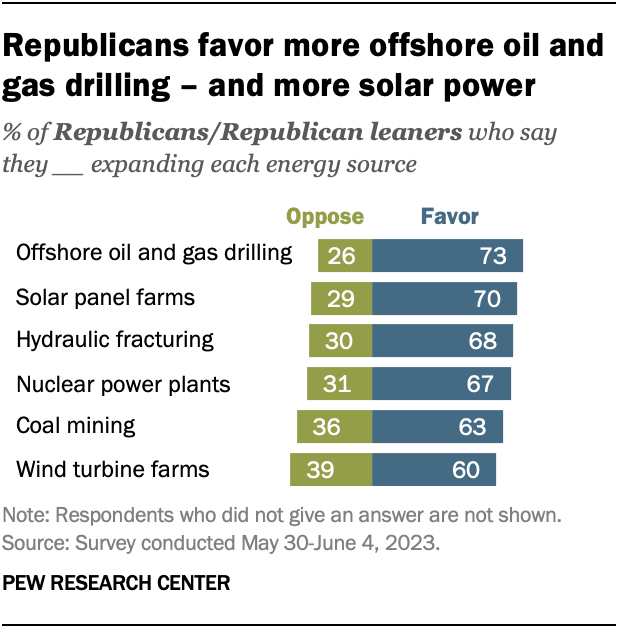
At the same time, comparable shares of Republicans support renewable energy production, including more solar power farms (70%) and more wind power (60%). In addition, two-thirds said they favor building more nuclear power plants, according to a June 2023 survey.
Still, when placed in competition with each other, Republicans prioritize fossil fuels over renewable energy sources. By a 58% to 42% margin, Republicans say expanding production from fossil fuel sources like oil and gas is a greater priority for the country than expanding renewable sources like wind and solar.
An overwhelming majority of Republicans (87%) say fossil fuels should continue to be part of the U.S. energy picture, rather than phasing them out entirely in favor of renewable sources. Looking ahead, 57% of Republicans believe the U.S. should never stop using oil, coal and natural gas.
Republicans are concerned about a transition to renewable energy in the U.S. One of the Biden administration’s top priorities is to shift the U.S. toward more renewable energy, with a goal of reaching net-zero emissions by 2050. Republicans express broad concern about such a shift: 87% say a transition away from fossil fuels and toward renewable energy sources would be very or somewhat likely to lead to unexpected problems for the country.
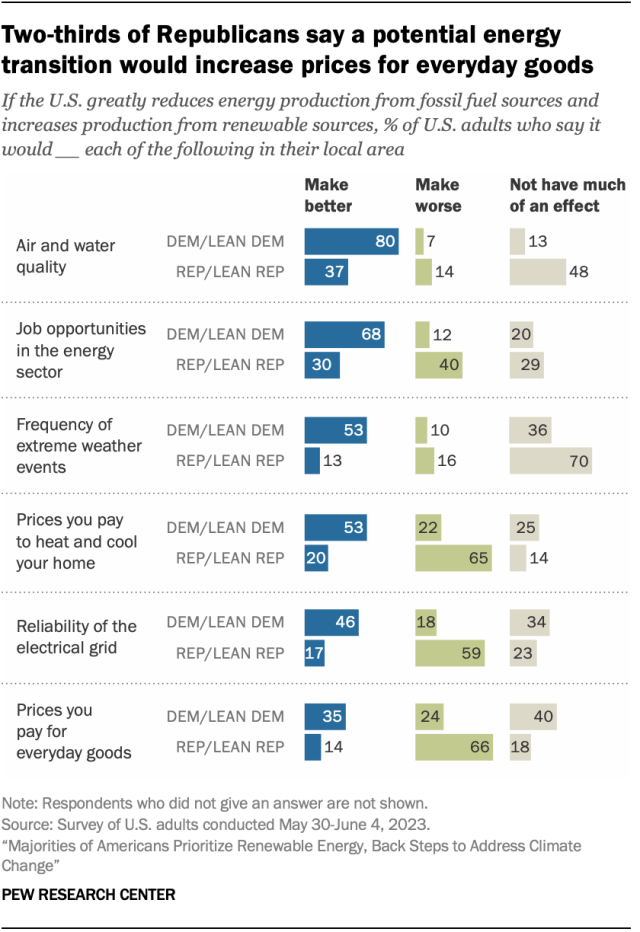
Specifically, Republicans worry that a renewable energy transition would increase prices and hurt the reliability of the electrical grid.
About two-thirds (66%) say prices for everyday goods would get worse if the U.S. greatly reduced fossil fuel energy production while increasing production from renewable sources. About the same share (65%) say this transition would increase home heating and cooling costs. And 59% expect the reliability of the electrical grid would get worse in a major shift toward renewable energy.
When it comes to transportation, Republicans are deeply skeptical about a shift from gasoline vehicles to electric vehicles. A large majority (84%) oppose phasing out the production of gas cars and trucks by 2035. And only 20% say they’d seriously consider an EV the next time they purchase a vehicle.
Republican doubts about renewable energy are more pronounced today than they were at the start of the decade. Much of this change occurred between 2020 and 2021, when President Joe Biden succeeded President Donald Trump in the White House. In 2020, for instance, 65% of Republicans prioritized the production of renewable energy over fossil fuels. That share fell to 47% in 2021, shortly after Biden took office.
During the same period, there were corresponding increases in GOP support for specific fossil fuel sources, like offshore oil and gas drilling. These opinion changes have largely persisted – or in some cases grown – over the last three years.
There are considerable age differences within the GOP in views of fossil fuels. Younger Republicans stand out from their older GOP counterparts on some climate and energy issues. For instance, a large majority of Republicans ages 18 to 29 (79%) say human activity, such as the burning of fossil fuels, contributes at least some to climate change – including 35% who think human activity contributes a great deal. A much smaller share of Republicans ages 50 and older (47%) say human activity contributes a great deal or some to climate change.
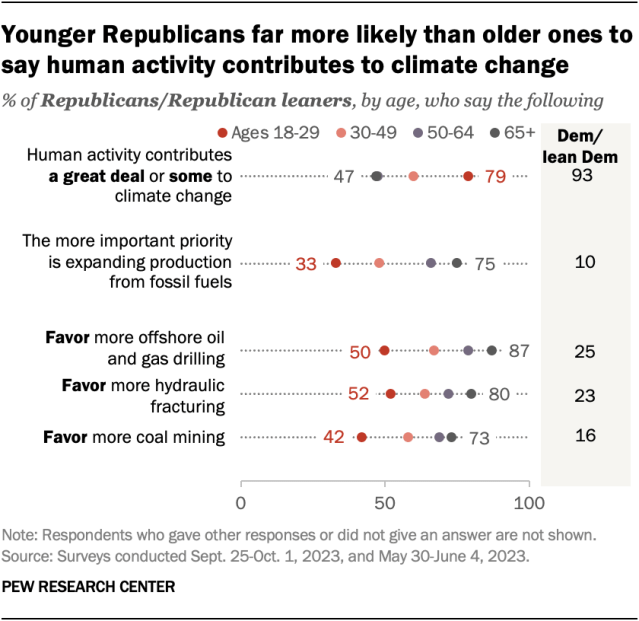
Younger Republicans are also far less supportive than their older counterparts of using more fossil fuel sources for energy. For example, half of Republicans ages 18 to 29 favor more offshore oil and gas drilling, compared with 87% of Republicans ages 65 and older.
Two-thirds of Republicans ages 18 to 29 also back prioritizing the development of renewable sources like wind and solar over expanding fossil fuels. The oldest Republicans take the opposite view: By a margin of 75% to 24%, Republicans ages 65 and older give priority to expanding the production of oil, coal and natural gas over renewable sources.
Relatively small shares of Republicans say climate change and extreme weather are having a significant impact on their own communities. A minority of Republicans (36%) say climate change is affecting their own community a great deal or some, according to a March 2023 survey. By contrast, 85% of Democrats believe it is affecting their local community at least some.
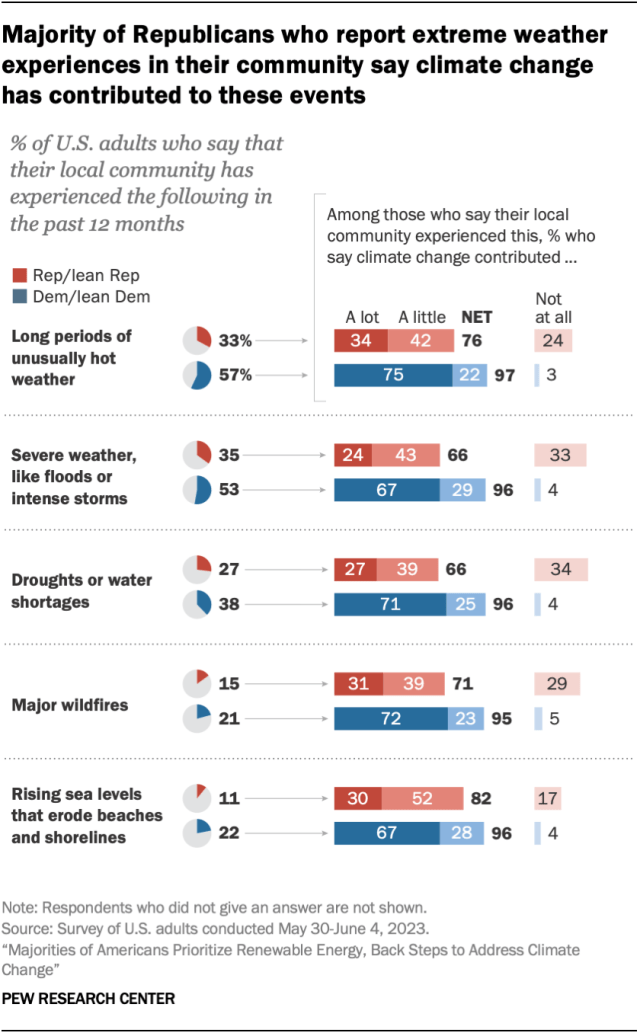
Perceptions of extreme weather differ by party as well. Republicans are less likely than Democrats to report that their local community has experienced at least one of five forms of extreme weather – including droughts, intense storms and wildfires – in the last year (58% vs. 79%). These partisan differences hold even when looking at Republicans and Democrats who live in the same region.
Studies have found that extreme weather events, such as intense storms, are expected to become more frequent and intense with climate change.
Still, among Republicans who report extreme weather impacts in their community (a group that tends to be younger and more ideologically moderate), most tie these events to climate change to some extent.
For example, 76% of Republicans who say their community has experienced long periods of unusually hot weather believe climate change has contributed at least a little – including 34% who say it has contributed a lot.
Overwhelming shares of Democrats who report experiencing extreme weather draw a connection to climate change, with most saying climate change contributed a lot to these events, rather than just a little.

